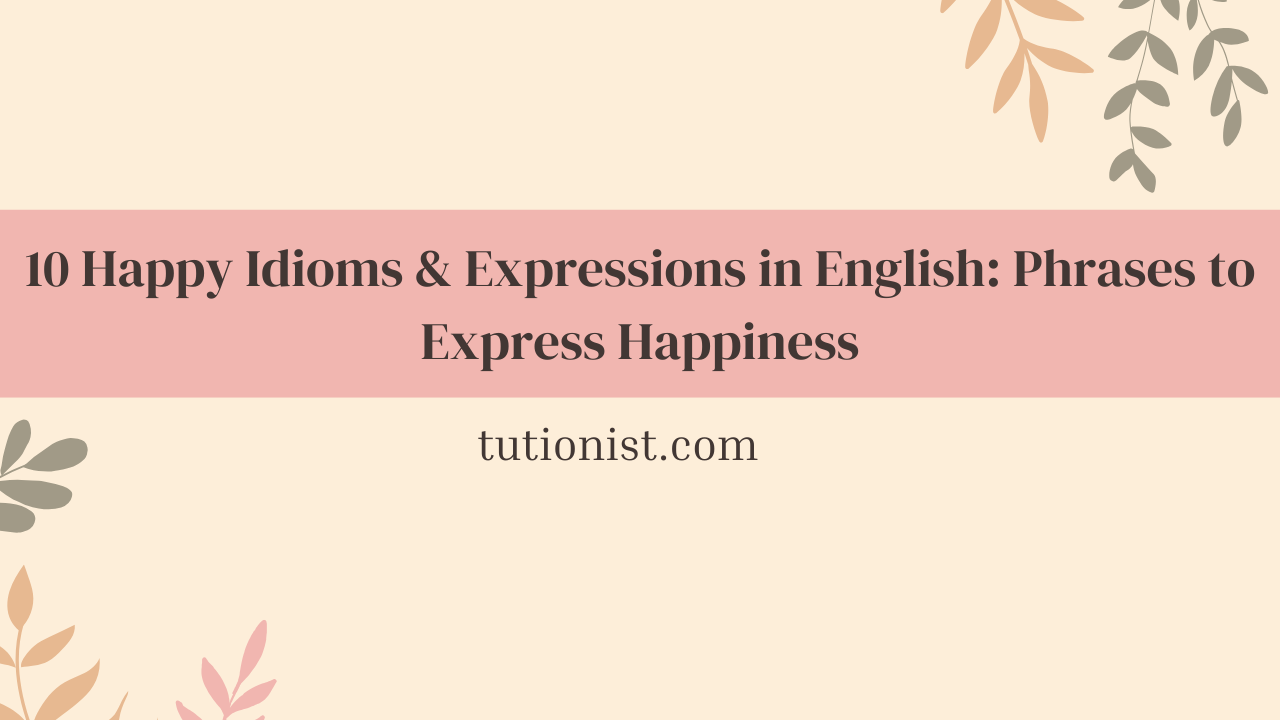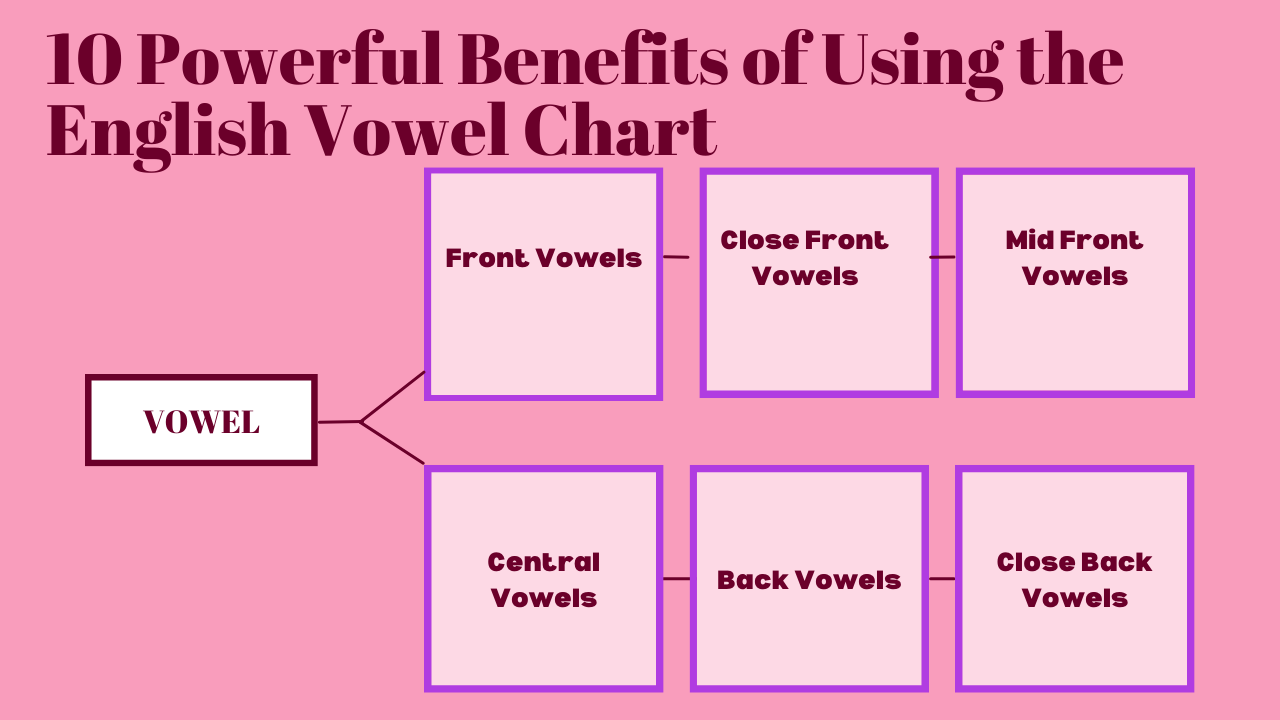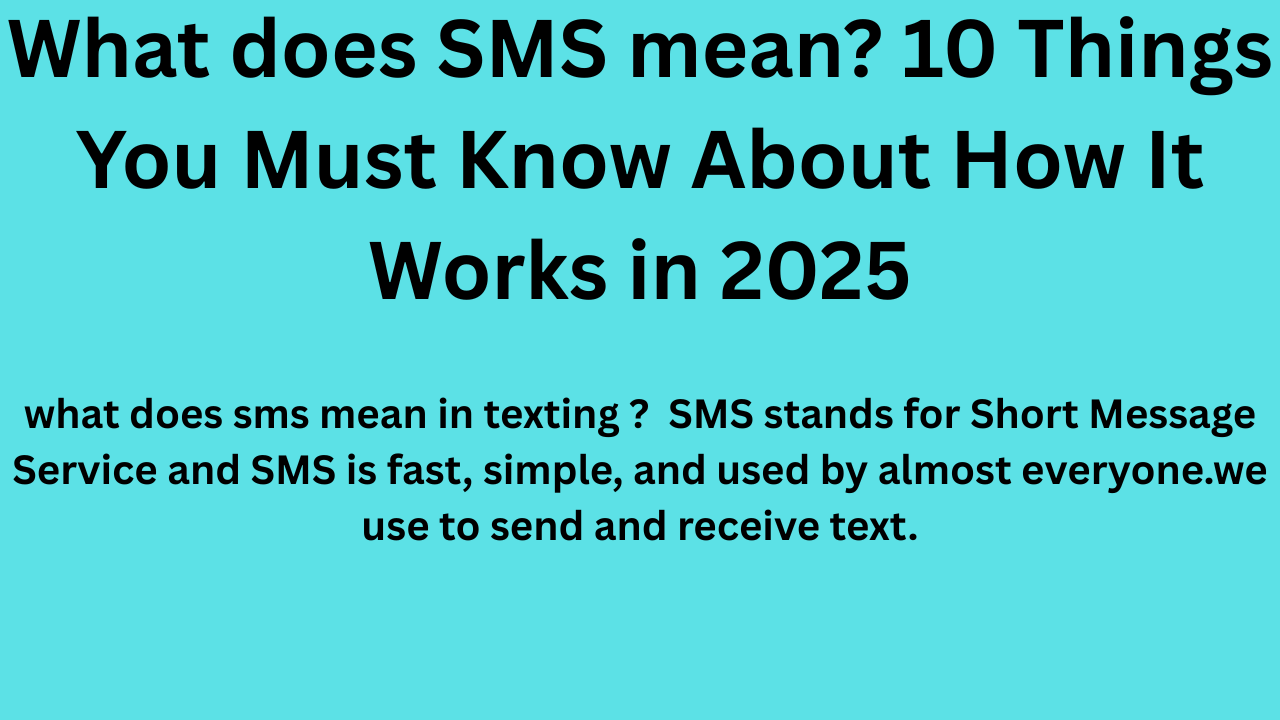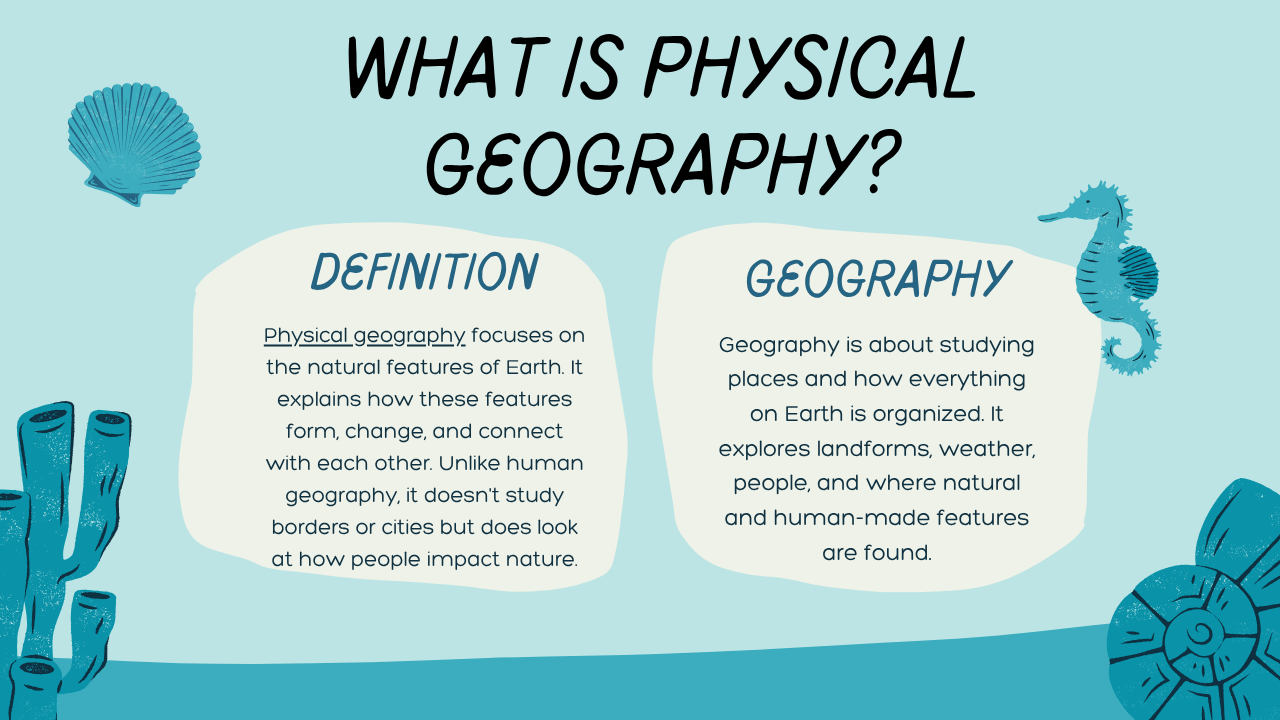Happiness is a universal emotion, but expressing it creatively in English can transform your conversations from ordinary to extraordinary. Happy idioms and expressions add color, personality, and cultural depth to your English communication, making you sound more like a native speaker.
Whether you’re celebrating a promotion, sharing good news with friends, or want to express joy more eloquently, mastering these English happiness phrases will enrich your vocabulary and boost your confidence in both casual and professional settings.
In this comprehensive guide, we’ll explore 10 essential happy idioms that native English speakers use daily, complete with meanings, origins, and practical examples you can start using immediately.
Why Learn Happy Idioms and Expressions?
Idioms are the heart and soul of any language. They reveal cultural values, historical context, and the creative spirit of native speakers. When you use happy expressions in English correctly, you demonstrate advanced language skills and cultural awareness that textbook English cannot provide.
Research from Cambridge University shows that idiom comprehension is directly linked to language proficiency levels. Students who master idiomatic expressions show significantly better performance in speaking fluency and listening comprehension tests.
Learning these expressions also helps you:
- Sound more natural in conversations
- Understand movies, TV shows, and books better
- Connect emotionally with English speakers
- Express nuanced feelings beyond basic vocabulary
- Improve your overall language fluency
1. On Cloud Nine
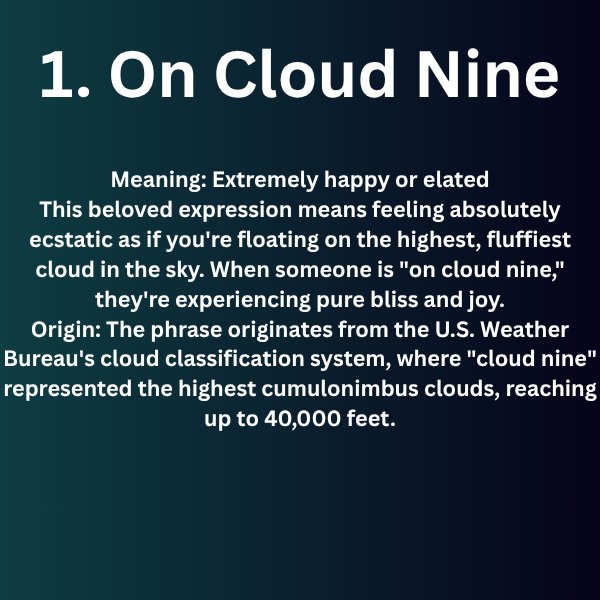
Meaning: Extremely happy or elated
This beloved expression means feeling absolutely ecstatic as if you’re floating on the highest, fluffiest cloud in the sky. When someone is “on cloud nine,” they’re experiencing pure bliss and joy.
Origin: The phrase originates from the U.S. Weather Bureau’s cloud classification system, where “cloud nine” represented the highest cumulonimbus clouds, reaching up to 40,000 feet.
Example Usage:
- “Sarah was on cloud nine after getting accepted to her dream university.”
- “I’ve been on cloud nine since my promotion was announced.”
- “The couple looked like they were on cloud nine during their wedding ceremony.”
When to Use: Perfect for describing extreme happiness about achievements, good news, or life-changing positive events.
2. Over the Moon
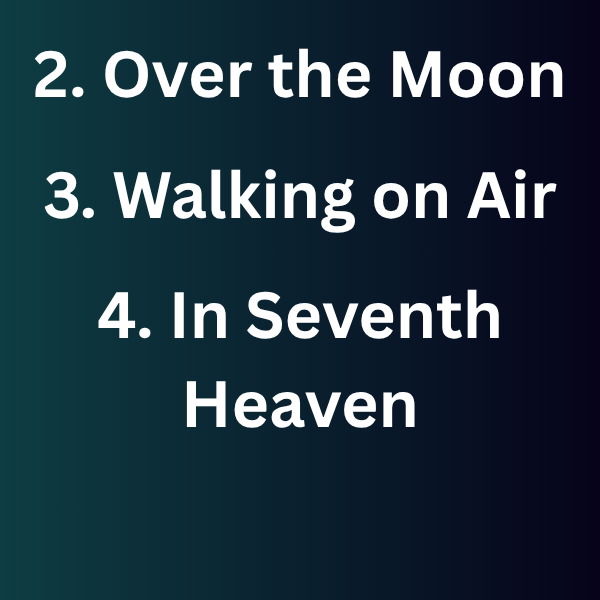
Meaning: Delighted beyond measure
When you’re “over the moon,” you’re so happy that you could metaphorically jump over the moon itself. This expression conveys intense joy and excitement that’s almost impossible to contain.
Origin: This phrase gained popularity from the 16th-century nursery rhyme “Hey Diddle Diddle,” featuring a cow jumping over the moon, symbolizing something wonderfully impossible.
Example Usage:
- “My parents were over the moon when I told them about my engagement.”
- “The team was over the moon after winning the championship.”
- “She’s over the moon about her new job opportunity in London.”
When to Use: Ideal for expressing overwhelming happiness about personal achievements, relationships, or unexpected good fortune.
3. Walking on Air
Meaning: Feeling light-hearted and joyful
This beautiful expression captures the sensation of being so happy that you feel weightless as if your feet barely touch the ground. It describes a state of euphoric contentment.
Example Usage:
- “Ever since he proposed, I’ve been walking on air.”
- “The students were walking on air after their graduation ceremony.”
- “Winning the lottery left them walking on air for weeks.”
When to Use: Perfect for describing sustained happiness that makes everything seem effortless and wonderful.
Ready to master these happy idioms and expressions with expert guidance? Join thousands of students who’ve improved their English fluency through personalized lessons at Tutionist.com.
4. In Seventh Heaven
Meaning: Experiencing perfect happiness
“Seventh heaven” represents the highest level of spiritual bliss in various religious traditions. In everyday English, it means reaching the pinnacle of happiness and satisfaction.
Origin: This phrase comes from ancient religious beliefs about multiple levels of heaven, with the seventh being the most divine and perfect.
Example Usage:
- “Grandma was in seventh heaven surrounded by all her grandchildren.”
- “Food lovers are in seventh heaven at this incredible restaurant.”
- “I was in seventh heaven during my vacation in the Maldives.”
When to Use: Excellent for describing moments of perfect contentment, often related to simple pleasures or spiritual satisfaction.
5. Happy as a Clam
Meaning: Completely content and satisfied
This charming American expression actually comes from the longer phrase “happy as a clam at high tide.” Since clams are safe from predators during high tide, they’re metaphorically “happy” and secure.
Example Usage:
- “After retiring, my grandfather is happy as a clam in his garden.”
- “The children were happy as clams playing at the beach all day.”
- “With her new hobby of painting, she’s happy as a clam every weekend.”
When to Use: Perfect for describing simple, peaceful contentment in everyday situations.
6. Grinning from Ear to Ear
Meaning: Smiling so widely that it stretches across your entire face
This vivid expression paints a clear picture of someone whose smile is so broad and genuine that it literally extends from one ear to the other, showing pure, uncontainable joy.
Example Usage:
- “The birthday girl was grinning from ear to ear when she saw her surprise party.”
- “He was grinning from ear to ear after acing his final exam.”
- “The new parents were grinning from ear to ear in the hospital photos.”
When to Use: Ideal for describing visible, infectious happiness that’s impossible to hide.
7. Tickled Pink
Meaning: Extremely pleased and delighted
When someone is “tickled pink,” they’re so happy they could metaphorically blush with pleasure. This expression combines the physical sensation of tickling with the color pink, traditionally associated with joy and pleasure.
Example Usage:
- “My mom was tickled pink when I surprised her on Mother’s Day.”
- “The author was tickled pink by the positive book reviews.”
- “We were tickled pink to hear about your promotion!”
When to Use: Perfect for expressing delight about compliments, surprises, or recognition from others.
8. Jump for Joy
Meaning: Express happiness through physical movement
This literal expression describes the natural human impulse to leap when experiencing intense physical happiness. It captures the connection between emotional and physical expression of joy.
Example Usage:
- “The kids literally jumped for joy when school was canceled due to snow.”
- “I could jump for joy knowing that my best friend is coming to visit.”
- “The entire stadium seemed to jump for joy after the winning goal.”
When to Use: Great for describing excitement so intense it requires physical expression.
9. Bursting with Happiness
Meaning: So happy you feel like you might explode with joy
This powerful expression suggests that your happiness is so intense it cannot be contained within your body. You’re metaphorically ready to “burst” from the overwhelming positive emotions.
Example Usage:
- “She was bursting with happiness after her wedding proposal.”
- “The proud father was bursting with happiness at his daughter’s graduation.”
- “I’m bursting with happiness about our upcoming vacation.”
When to Use: Excellent for describing overwhelming joy that demands to be shared with others.
10. Having a Ball
Meaning: Enjoying yourself tremendously
This fun expression means you’re having such a wonderful time that it feels like you’re at a grand ball or celebration. It emphasizes active enjoyment and engagement in pleasurable activities.
Example Usage:
- “The teenagers were having a ball at the school dance.”
- “We had a ball exploring the local markets during our trip.”
- “My grandmother is having a ball learning to use social media.”
When to Use: Perfect for describing active, engaging fun and entertainment.
How to Use Happy Idioms Naturally in Conversation
Mastering these English expressions for happiness requires understanding context and cultural appropriateness. Here are expert tips for natural usage:
Consider Your Audience:
- Use more formal expressions like “over the moon” in professional settings
- Save playful phrases like “happy as a clam” for casual conversations
- Match the intensity of the idiom to the situation
Practice in Context:
- Start with one idiom per week and use it daily
- Write example sentences using different tenses
- Listen for these expressions in movies and podcasts
Cultural Sensitivity:
- Understand that some idioms are more American vs. British
- Learn the appropriate situations for each expression
- Practice pronunciation and stress patterns
Common Mistakes to Avoid
Overusing Idioms: Don’t use multiple idioms in a single conversation. One well-placed expression is more effective than several forced phrases.
Wrong Context: Avoid using overly enthusiastic expressions for minor positive events. Match the idiom’s intensity to the situation’s importance.
Literal Translation: Don’t directly translate these idioms into other languages, as they often don’t make sense literally.
Expanding Your Happy Vocabulary
Beyond idioms, consider learning these related happiness expressions:
Adjectives for Happiness:
- Ecstatic, elated, jubilant, euphoric, exhilarated
- Blissful, content, cheerful, upbeat, radiant
Verbs for Expressing Joy:
- Rejoice, celebrate, beam, glow, sparkle
- Cheer, delight, thrill, enchant, inspire
Advanced Expressions:
- “Beside myself with joy”
- “In high spirits.”
- “Floating on air”
Want to master these expressions and achieve fluency in English? Discover personalized English lessons at Tutionist.com – where expert tutors help you speak English with confidence and cultural awareness.
Conclusion
Mastering these 10 happy idioms and expressions in English will transform your ability to communicate joy, excitement, and contentment with native-like fluency. From being “on cloud nine” to “having a ball,” these phrases add emotional depth and cultural authenticity to your English conversations.
Remember that effective use of idioms comes from understanding context, practicing regularly, and observing how native speakers use these expressions naturally. Start incorporating one or two of these phrases into your daily conversations, and gradually build your repertoire as you become more comfortable.
The journey to mastering English happiness phrases is itself a reason to be happy! Each new expression you learn brings you closer to fluent, natural English communication that genuinely connects with native speakers on an emotional level.
Whether you’re sharing good news, celebrating achievements, or simply expressing daily contentment, these idioms will help you communicate your happiness in ways that are both memorable and culturally appropriate.
Ready to express your happiness fluently in English? Start your journey with expert English tutors at Tutionist.com and discover how personalized lessons can accelerate your path to natural, confident English communication.
Frequently Asked Questions
Are these happy idioms used in both American and British English?
Yes, most of these expressions are widely understood in both American and British English. However, some phrases like “happy as a clam” are more commonly used in American English, while “over the moon” is particularly popular in British English. The context and frequency of use may vary slightly between regions, but all these idioms are recognized internationally.
How can I remember all these happy idioms and when to use them?
The best way to remember idioms is through active practice and contextual learning. Start by choosing 2 to 3 expressions that resonate with you, then use them in honest conversations or writing. Create mental associations with situations where you use each idiom. For example, associate “on cloud nine” with significant achievements and “happy as a clam” with peaceful, simple moments.
Can I use these expressions in formal writing or business settings?
While most of these idioms are acceptable in conversational business settings, use them judiciously in formal writing. Expressions like “over the moon” or “delighted beyond measure” work well in professional contexts. At the same time, phrases like “happy as a clam” or “having a ball” are better suited for casual communication. Always consider your audience and the level of formality required.
What’s the difference between being “on cloud nine” and “over the moon”?
Both expressions indicate extreme happiness, but they have subtle differences. “On cloud nine” suggests a dreamy, floating sensation of contentment that might last longer. “Over the moon” implies more active, energetic excitement that’s often related to specific news or events. Both are appropriate for describing major positive life events.
How am I using these idioms correctly in conversation?
Pay attention to native speakers’ reactions and responses. If they seem confused or ask for clarification, you might be misusing the idiom or in the wrong context. Practice with language exchange partners or tutors who can provide immediate feedback. Watch English movies and TV shows to hear these expressions used naturally, and don’t be afraid to ask native speakers about appropriate usage.
Read Also:

